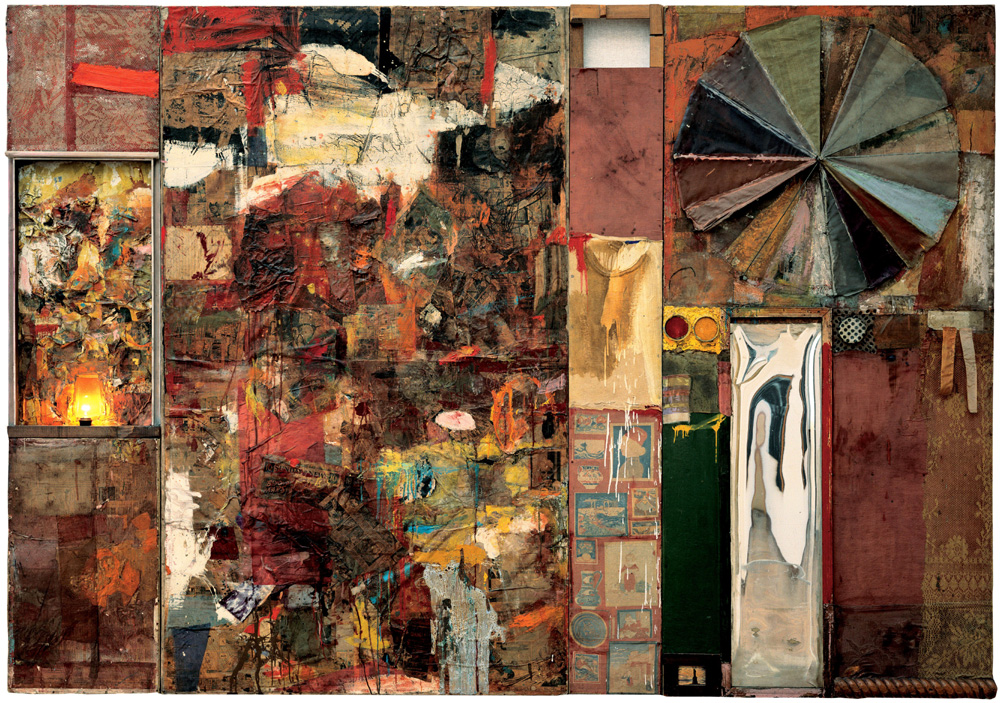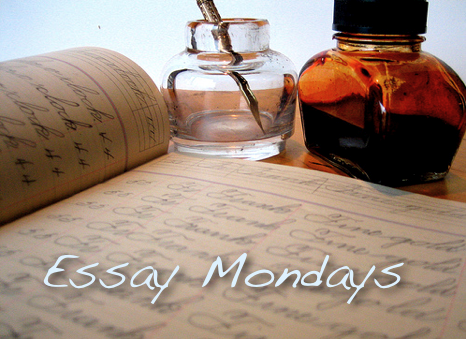The painter and collage-ist Robert Rauschenberg came of age during the heyday of abstract expressionism in the New York scene; and while his own work involves a similar level of abstraction (as, for example, 1954's Charlene, pictured above), he often found himself at odds with the dominant rhetoric of the "tortured artist." "There was something about the self-confession and self-confusion of abstract expressionism," he says, "that personally always put me off."
There was a whole language that I could never make function for myself; it revolved around words like "tortured," "struggle," "pain" [...] I could not see such conflicts in the materials and I knew that it had to be in the attitude of the painter [...] I used to think of that line in Allen Ginsberg's "Howl," about the sad cup of coffee. I've had cold coffee and hot coffee, good coffee and lousy coffee. But I've never had a sad cup of coffee.
Elsewhere, Rauschenberg tells his biographer "Work is my joy [...] I don't know anybody who loves work as much as I do."1
I thought about Rauschenberg a lot while reading Georges Perec's Life A User's Manual, and not just because Perec takes the novel to a conceptual height similar to that of the painter's "assemblage" innovations, or because they share a fondness for surprising connections among seemingly unrelated objects and stories, or because they both craft the unusual out of aggressively ordinary materials. No, what really struck me about the two men is the sheer joy they both seem to take in their chosen art form: their ecstatic fearlessness in the face of constraint, or lack thereof. To adopt Rauschenberg's language, I had seen many of the materials Perec uses before: the humorously overdone cataloging of objects, for example, and the repeated obsession with ordering of objects, both appear in the work of Perec's forerunners Samuel Beckett and Julio Cortázar, and his admirer Roberto Bolaño. But seldom have I seen these elements used as tools of sheer delight in the way Perec uses them. In Bolaño's 2666, the forensic cataloging of corpses reinforces the inhumanity of the Santa Teresa killings, and Beckett's characters' obsessive need to catalog the objects and events around them is a symptom of their sinister (yet hilarious) inability to break out of stagnation.
But Perec? It's easy to tell that for Perec, as for Rauschenberg, work—storytelling, word-painting—is a joy. Like his character Bartlebooth, he sets himself a strict yet more or less meaningless structural challenge. In Bartlebooth's case, this challenge consists of an ostensibly zero-sum loop: spend a decade learning to paint watercolors; two decades sailing around the world and painting sea-ports, which are then sent back to France and cut into jigsaw puzzles; two decades, upon his return, solving the jigsaw puzzles, upon which they are reconstituted and returned to their place of composition, dunked in an acid bath, and returned to their original state of pristine white paper. For Perec, the challenge is to construct a novel out of a series of motionless vignettes, each vignette featuring a different room or corridor in the same apartment building, at a moment when one particular event is taking place. Both the author and the character go about their assigned tasks with remarkable vigor, but Perec's performance is more remarkable than Bartlebooth's: whereas the fictioneer is merely competent, the author's narrative expands within his structural framework, flexing and reaching, revealing a tapestry of interwoven stories, all the tales of the current and former residents of the rue Simon-Crubellier as revealed through their rooms: their divans and settees; their crumpled letters lying in waste-paper bins; their traveling trunks stowed in their cellars; their blackened pearls; reproduction wall-hangings; foreign currency; collectible ink-blotters; books and paintings; photographs tucked under arms; all the artifacts of a century or more.
Life seems to me at once a compulsively structured exercise and a mass of undifferentiated stuff. In the face of this dichotomy, it's unsurprising that the book displays an obsession with the different possible ways of ordering things. The passages dealing with this obsession were consistently among my favorites; in addition to being great fun, I think they reflect something important about the book's essence. From a multitude of angles, Perec seems to be asking: "Is there a "proper" order to the objects we encounter? Are some methods of ordering better than others? Are all equally valid?" Here, for example, is Bartlebooth's valet Smautf, fretting over how (or, in the end, WHETHER) to sort the labels from his employer's twenty years of travel:
He wanted, so he said, to sort the labels into order, but it was very difficult: of course, there was chronological order, but he found it poor, even poorer than alphabetical order. He had tried by continents, then by country, but that didn't satisfy him. What he would have liked would be to link each label to the next, but each time in respect of something else: for example, they could have some detail in common, a mountain or volcano, an illuminated bay, some particular flower, the same red and gold edging, the beaming face of a groom, or the same dimensions, or the same typeface, or similar slogans ("Pearl of the Ocean," "Diamond of the Coast"), or a relationship based not on similarity but on opposition or a fragile, almost arbitrary association: a minute village by an Italian lake followed by the skyscrapers of Manhattan, skiers followed by swimmers, fireworks by candlelit dinner, railway by aeroplane, baccarat table by chemin de fer, etc. It's not just hard, Winckler added, above all it's useless: if you leave the labels unsorted and take two at random, you can be sure they'll have at least three things in common.
What strikes me about this passage is Smautf's criterion of "satisfaction": his preference for one classification system over another is pretty much purely a matter of aesthetics. By contrast, Western civilization has a lot of angst tied up in arguments over "true" classification: how closely grouped are humans and apes? Should animals be classed by method of reproduction, type of food, outer body covering, number of appendages, or some other factor? Should pagans be considered closer to Christians than Muslims? What is more valuable: a Fabergé egg or a Tiffany lamp? Here is Perec, arguing that all methods of classification are imposed from without, essentially a form of art, and that we are free to choose whichever schema appeals to us personally. Unless, like Winckler's jigsaws, a puzzle has been crafted with the puzzler in mind (which most of life, Perec seems to argue, is not), there is no "right" or "wrong" order.
Obviously, this idea can play havoc with one's idea of propriety and value, but it can also come as a relief, or even be exhilarating. Here, for example, we see the entire apartment building needlessly agonizing over the correct pronunciation of a neighbor's name, spelled "Cinoc":
Obviously the concierge didn't dare address him as "Nutcase" by pronouncing the name "Sinok." She questioned Valène, who suggested "Cinosh"; Winckler, who was for "Chinoch"; Morellet, who inclined toward "Sinots"; Mademoiselle Crespi, who proposed "Chinoss"; François Gratiolet, who prescribed "Tsinoc"; and finally Monsieur Echard, as a librarian well versed in recondite spellings and the appropriate ways of uttering them, demonstrated that, leaving aside any potential transformation of the intervocalic "n" into a "gn" or "nj" sound, and assuming once and for all, on principle, that "i" was pronounced "i" and the "o," "o," there were then four ways of saying the initial "c": "s," "ts," "sh," and "ch," and five ways of pronouncing the final: "s," "k," "ch," "sh," and "ts," and that, as a result, depending on the presence or absence of one or another diacritic sign or accent and according to the phonetic particularities of one or another language or dialect, there was a case for choosing from amongst the following twenty pronunciations:
SINOS SINOK SINOCH SINOSH SINOTS TSINOS TSINOK TSINOCH TSINOSH TSINOTS SHINOS SHINOK SHINOCH SHINOSH SHINOTS CHINOS CHINOK CHINOCH CHINOSH CHINOTS
As a result of which, a delegation went to ask the principal person concerned, who replied that he didn't know himself which was the most proper way of pronouncing his name.
It turns out that the family's original surname was "Kleinhof," a pronunciation nobody would have considered based on the current spelling, and Cinoc himself maintains that "it wasn't at all important whichever way you wanted to pronounce it." Here we have all the humans in the rue Simon-Crubellier attempting to ascertain the "correct" order and combination of sounds to designate their neighbor, when in point of fact there literally IS no correction pronunciation, since Cinoc's name has traveled so far from the original "authentic" Kleinhof (if indeed "Kleinhof" itself was authentic) that it's no longer reasonable to claim that it ought to be pronounced in the old way, but no definitive new way has been settled upon by Cinoc himself or by anyone else. Thus, it seems to me, Perec often shows us puzzle pieces belonging to no puzzle—or, maybe, objects that have a tendency to look like puzzle pieces, but which are actually some quite different object, unless, like the collector of unica who must decide what qualifies as "genuine" and "one-of-a-kind," we can find a way to make them fit into an aesthetically-created puzzle of our own invention.
Life A User's Manual was, ironically, my April read for the Non-Structured Book Group.
Other posts:
- Claire at Kiss a Cloud
- E.L.Fay at This Book and I Could Be Friends
- Frances at Nonsuch Book
- Isabella at Magnificent Octopus
- Julia at A Number of Things
- Richard at Caravana de recuerdos
Up next month: Margo Lanagan's Tender Morsels!
1All Rauschenberg quotes pulled from Robert Rauschenberg, a full-color monograph with text by Sam Hunter, published by Ediciones Polígrafa.






